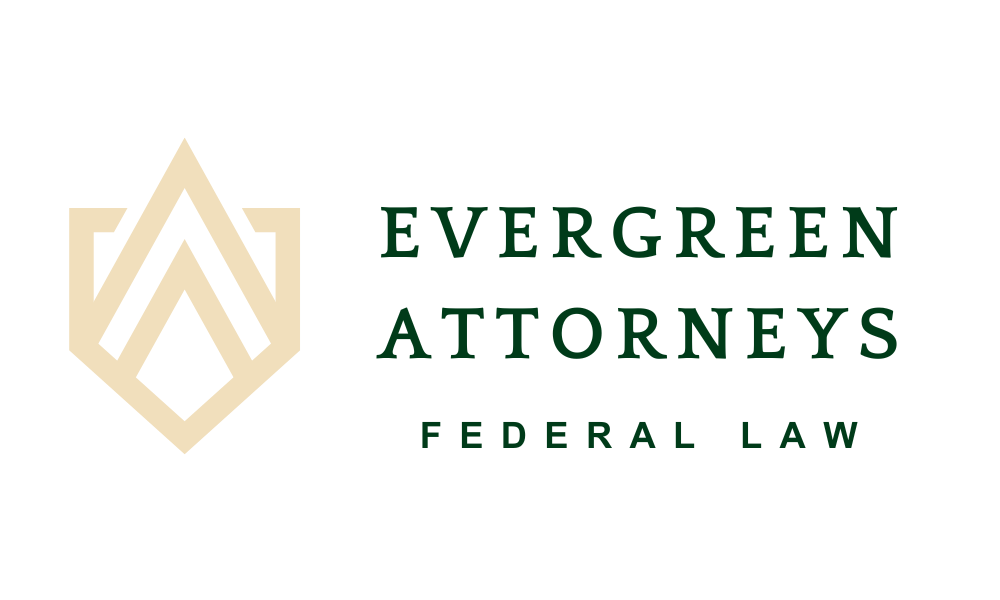Share
Share

Tampa Bay Federal Restitution Lawyers
Evergreen Attorneys know that in white collar crime cases the financial penalties are often just as impactful as the potential prison sentences. Tampa Bay federal restitution lawyers need to know the ins and outs of federal restitution, forfeiture, civil asset forfeiture, and other federal laws to best protect their clients. Resolving a federal white collar crime case should not mean that you lose everything you’ve built in your life through hard work and dedication. But many so-called criminal lawyers fail to appreciate just how important federal restitution issues are in every white collar crime case.
The Tampa Bay federal restitution lawyers at Evergreen Attorneys are different. We know that it’s just as important to our clients to know whether or not they can protect their house, their retirement, or even their children’s college fund as any other facts are when making a decision in a white collar crime case.
In this article, our Tampa Bay federal restitution team addresses recent developments in restitution law that apply to everyone in Florida. Specifically, Evergreen Attorneys explain how federal restitution can impact a white collar crime defendant even after their sentence and supervised release are completed.
Are you facing serious federal restitution or forfeiture issues in a white collar crime case in Tampa Bay? If so, call the experienced criminal defense team at Evergreen Attorneys at (303) 948-1489 or fill out a contact form on our website today to see how we can help.
Tampa Bay Federal Restitution Basics
Our white collar crime team at Evergreen Attorneys have previously covered introductory issues in restitution during other blog posts on our site. So we will keep this introduction brief.
Generally speaking (and we do mean generally here), federal criminal courts are required to enter so-called restitution orders that require federal criminal defendants to make victims whole for their losses as part of a criminal sentence. This means figuring out what the actual loss was to the alleged victim, computing a number, and then incorporating this into a restitution amount in the sentencing process.
This is very different from the “loss amount” under the Sentencing Guidelines. You can read about the basics on calculating loss amount under the Sentencing Guidelines (which in turn drives the advisory sentencing guideline range) in this Sentencing Commission primer. Loss amounts are almost higher than the restitution amount because 1) loss under the Guidelines includes “intended loss” in addition to actual real world loss and 2) relevant conduct which may not be accountable for in restitution.
Practice Tip: if your federal white collar crime lawyer can not easily and readily tell you the difference between the “loss amount” and the restitution amount and how those are calculated, you need to run, not walk, out of their office immediately.
Back to Tampa Bay federal restitution basics though. The Mandatory Victims Restitution Act (commonly called the MVRA) requires restitution in virtually every federal case. See 18 U.S.C. 3663A(a)(1). There are some offenses that are governed by the older Victim and Witness Protection Act (VWPA) as well. See 18 U.S.C. Section 3663. In either event, restitution is going to be called for in the vast majority of cases.
Do I have to pay restitution after federal supervised release ends?
Federal restitution is almost always imposed as part of a federal white collar crime case. That means that the criminal judgment requires defendants to pay a specified amount to victims as compensation for their actual and provable real-world losses. This obligation is certainly in effect during a person’s criminal sentence (think probation or time of imprisonment). It also continues during a white collar crime defendant’s term of supervised release. Failing to timely and appropriately pay restitution during supervised release can result in punitive sanctions including an extension of the supervised release period or even incarceration.
Often federal restitution judgments can require payments of hundreds of thousands of dollars (if not millions) to the alleged victims. Many federal white collar crime defendants will find it incredibly difficult to pay those sums back during a short supervised release period of say three to five years. What happens if you still owe money on federal restitution after the period of supervised release ends?
This is exactly the issue that was raised in the recent case of United States v. Mims, 143 F.4th 1311 (11th Cir. 2025).
Mikel Mims Restitution Facts
In 2014, Mims pleaded guilty to one count of wire fraud conspiracy and was sentenced to three years of probation. Additionally, the district court ordered her to pay $255,620 in restitution as part of her criminal sentence. As is often the case, the district court allowed the restitution to be paid back on a payment plan. In this case, Mims was ordered to pay back the restitution at the rate of 10% of her gross monthly earnings.
Three years later, in 2017, Mims completed her restitution and stopped making any further payments on her restitution. Mims paid $58,232.93 towards her total restitution balance ($255K) before she stopped making payments. Approximately four years passed with Mims making no payments and thinking she could move on with her life.
In 2021, Mims was sent three different forms seeking financial information from Mims. These forms are commonly sent during the period of supervised release or probation, but rarely sent after those periods end. Mims did not provide the government with any information. The government subsequently sought to have a hearing in the district court on Mims’ failure to pay the remaining restitution amounts.
Mims argued that the district court no longer had jurisdiction in the criminal case to enforce the restitution amount after her probation period ended. The government argued jurisdiction existed under various provisions of federal law. The district court sided with the government, ordered Mims to comply with her prior payment schedule and timely fill out new financial documentation upon request by the government. Mims then filed an appeal to the Eleventh Circuit.
11th Circuit: Restitution Jurisdiction Continues Forever
Let’s start with what was not at issue. Everyone agreed that the restitution order in Mims’ case was still effective as a judgment because restitution judgments themselves are enforceable for at least 20 years (subject to later renewal). The Eleventh Circuit was not asked to consider whether or not the restitution judgment itself was still enforceable. Instead, the Eleventh Circuit evaluated whether or not the federal criminal court still had jurisdiction over the enforcement of the restitution judgment after the period of probation and/or supervised release had ended.
According to the Eleventh Circuit, the district court possessed ancillary jurisdiction to enforce its prior criminal restitution order. The “ancillary-jurisdiction” doctrine is very limited and recognizes federal courts’ jurisdiction (power) over some matters that are incidental to other matters properly before them. The idea behind the ancillary jurisdiction doctrine is that to function properly, federal courts need the power to monitor compliance of its orders and proceedings to see things through to the end.
Importantly, ancillary jurisdiction is a limited doctrine. The U.S. Supreme Court has often found that ancillary jurisdiction does not exist when it addresses the question. See Kokkonen v. Guardian Life Ins., 511 U.S. 375 (1994) (declining to find ancillary jurisdiction existed).
Why is the Mims decision important? First, this issue had never been addressed by any other U.S. Court of Appeals. That means it is an “issue of first impression” in this case and worth learning about. Second, Mims is a legal masterclass in going through the various ways that restitution orders may be enforced and their authority. For example, many white collar crime lawyers are unfamiliar with the provisions in Federal Rule of Criminal Procedure 38(e) which provides:
(e) Restitution and Notice to Victims.
(1) In General. If the defendant appeals, the district court, or the court of appeals under Federal Rule of Appellate Procedure 8 , may stay—on any terms considered appropriate—any sentence providing for restitution under 18 U.S.C. §3556 or notice under 18 U.S.C. §3555 .
(2) Ensuring Compliance. The court may issue any order reasonably necessary to ensure compliance with a restitution order or a notice order after disposition of an appeal, including:
(A) a restraining order;
(B) an injunction;
(C) an order requiring the defendant to deposit all or part of any monetary restitution into the district court’s registry; or
(D) an order requiring the defendant to post a bond.
Fed. R. Crim. P. 38(e). Why do most federal criminal defense attorneys not know about this provision? Because for the vast majority of federal criminal lawyers they will have a myopic focus on the amount of prison time at issue. They simply know nothing about how restitution works in a white collar crime case.
Third, Mims case is important because you can expect Tampa Bay federal criminal defendants to face new demands for information long after their sentence has expired if they still owe restitution. Tampa Bay is part of the Middle District of Florida judicial district. The Middle District of Florida has one of the most notoriously aggressive Financial Litigation Units in the entire country. They are known for taking aggressive positions such as trying to seize or foreclose on criminal defendants’ houses even when there is an entirely innocent spouse.
Restitution collection after federal criminal sentence
What are the takeaways for concerned defendants post-Mims? First, even if your sentence is completely finished you need to carefully consider your options concerning restitution collection efforts. After this decision, you may need to consider retaining experienced Tampa Bay federal restitution lawyers if you receive a demand for financial documentation from the government.
Second, you will need to consider taking proactive steps to protect your assets. There are always things that can be done to structure your affairs in a way that is most beneficial. It is important to do this with the advice of counsel to avoid any claims of fraudulent transfers.
Third, you will want to aggressively negotiate where you can on a repayment plan for restitution that benefits you. There is a massive difference between paying a monthly 10% of gross earnings and the federal government seizing your entire 401(k). Which category would you rather be in?
Federal restitution lawyers in Tampa Bay
Federal restitution before and after sentencing is incredibly complex. It involves the interplay of civil and criminal law. You need to be prepared to fight for your rights to a fair restitution outcome even if you are trying to negotiate a resolution in federal criminal court. Contact the Tampa Bay federal criminal defense team at Evergreen Attorneys today if you need to discuss your restitution options.
Call (303) 948-1489 or email [email protected] today to discuss your situation.
Zachary Newland
Zachary Newland is an attorney, author, aspiring BBQ connoisseur, and mediocre skier. Zachary's law practice is focused on federal criminal defense, federal appellate advocacy including post-conviction remedies, civil rights litigation, and complex trial work. Zach lives in Evergreen, Colorado with his family. You can reach Zach at [email protected] to discuss your case or call him directly at 303-948-1489.
STAY IN THE LOOP
Subscribe to our free newsletter.
Colorado Healthcare Fraud Investigations Colorado [...]
The OIG’s Audit of the [...]





